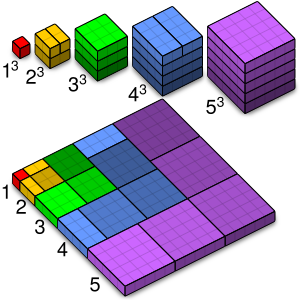Nicomachus facts for kids
Nicomachus of Gerasa (around 60 – 120 AD) was an important ancient mathematician and music expert. He is best known for his books Introduction to Arithmetic and Manual of Harmonics. He was born in Gerasa, which is now Jerash, Jordan. Nicomachus was a Neopythagorean, meaning he believed numbers had special, even mystical, properties.
Contents
Life of Nicomachus
Not much is known about Nicomachus's life, except that he was a Pythagorean from Gerasa. Historians call him a Neopythagorean because he believed numbers had mystical powers. We know he lived around 100 AD because he mentioned a person named Thrasyllus in his Manual of Harmonics. Also, his Introduction to Arithmetic was translated into Latin around the mid-2nd century.
Nicomachus wrote his Manual of Harmonics for a noble lady who asked him to write it. This shows he was a respected scholar. He also mentioned that he wanted to write more advanced books, but his frequent travels left him short on time.
Nicomachus's Works
Nicomachus wrote several important books that helped people understand mathematics and music in his time. His most famous works are about numbers and the theory of music.
Introduction to Arithmetic
His book Introduction to Arithmetic (called Arithmetike eisagoge in Greek) was a simpler work on numbers. As a Neopythagorean, Nicomachus was often more interested in the mystical side of numbers than just their mathematical uses.
He talked about two kinds of numbers:
- Divine numbers: These were like perfect ideas or concepts.
- Scientific numbers: These were used to measure real things.
Nicomachus wrote a lot about numbers, especially the importance of prime numbers and perfect numbers.
- Prime numbers are numbers that can only be divided evenly by 1 and themselves (like 2, 3, 5, 7).
- Perfect numbers are numbers where the sum of their proper divisors (divisors excluding the number itself) equals the number itself (for example, 6 is a perfect number because 1 + 2 + 3 = 6).
He believed that arithmetic (the study of numbers) was the most important of all mathematical sciences. He thought it came before music, geometry, and astronomy, and was the reason for them. Much of Boethius's De institutione arithmetica is a Latin translation of Nicomachus's work.
However, Nicomachus's Introduction to Arithmetic sometimes had simple errors. This shows that he often didn't provide proofs for his results. Many of his ideas were already known from Euclid's Elements, but Euclid had provided proofs. Sometimes, Nicomachus would state something that wasn't true and then use an example that seemed to fit, suggesting some of his ideas were just guesses based on examples.
Even though people in Babylonia and China had them earlier, Nicomachus created one of the first multiplication tables in the Greco-Roman world. The oldest surviving Greek multiplication table is from the 1st century AD.
Manual of Harmonics
Nicomachus's Manual of Harmonics (Encheiridion Harmonikes in Greek) is a very important book about music theory. It was the first major music theory book since the time of Aristoxenus and Euclid.
This book tells the earliest known story of Pythagoras discovering that musical pitch is related to number ratios. The story says Pythagoras found this out by listening to hammers in a blacksmith's shop. Nicomachus also gave the first detailed explanation of how music connects to the order of the universe, through the idea of the "music of the spheres." This idea suggests that planets and stars make a kind of music as they move.
Nicomachus also described the instruments of his time, which gives us valuable information today. Besides this Manual, there are ten other short writings that seem to be from a larger, lost work on music.
Lost Works
Nicomachus wrote other works that are now lost. These include:
- A larger book on arithmetic, called Art of Arithmetic.
- A bigger book on music, which Nicomachus himself mentioned he planned to write.
- An Introduction to Geometry, though it's not clear if he wrote it himself.
- Theology of Arithmetic, which was about the mystical properties of numbers according to Pythagorean beliefs.
- A Life of Pythagoras, which was used by later writers like Porphyry and Iamblichus for their own books about Pythagoras.
- A collection of Pythagorean ideas.
See also
 In Spanish: Nicómaco de Gerasa para niños
In Spanish: Nicómaco de Gerasa para niños
 | Stephanie Wilson |
 | Charles Bolden |
 | Ronald McNair |
 | Frederick D. Gregory |


